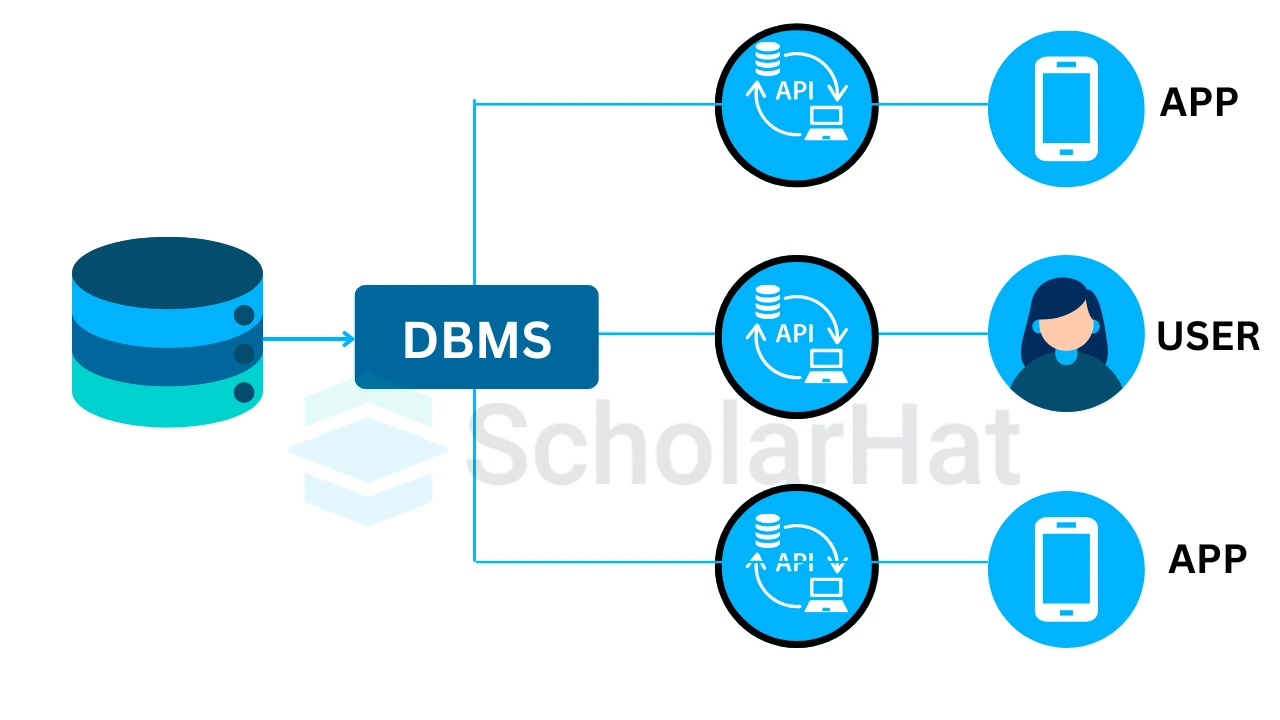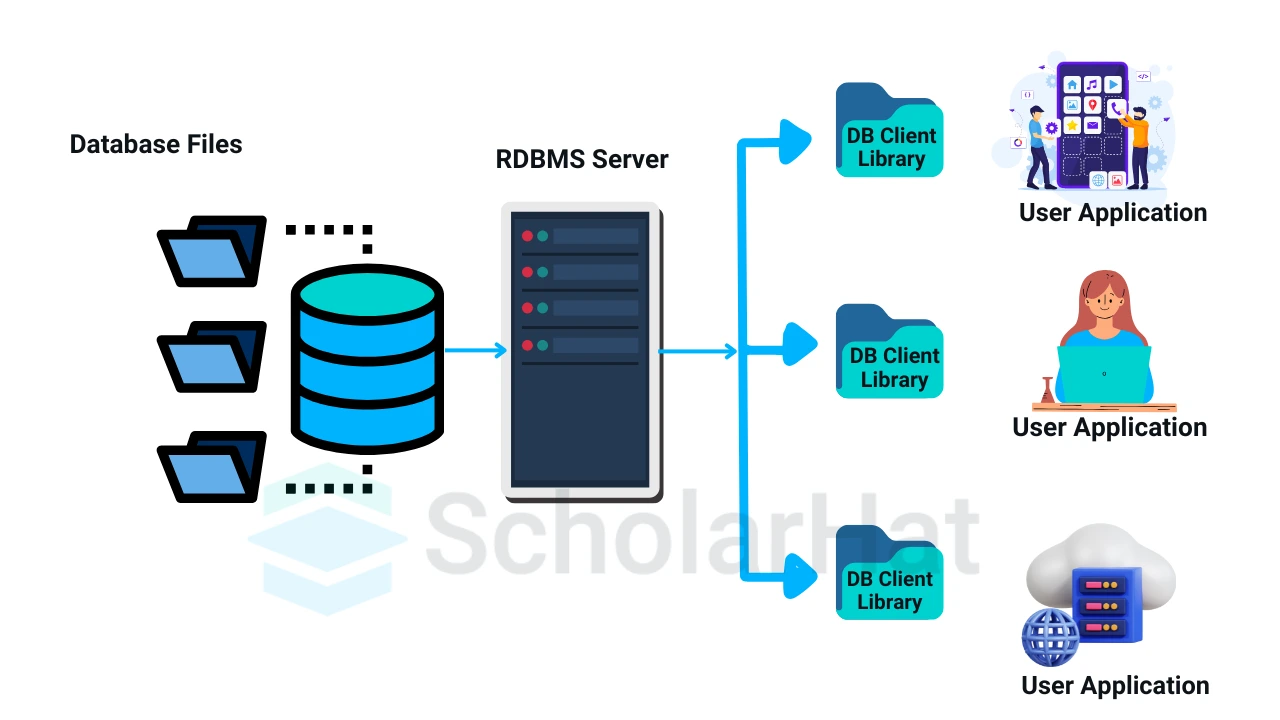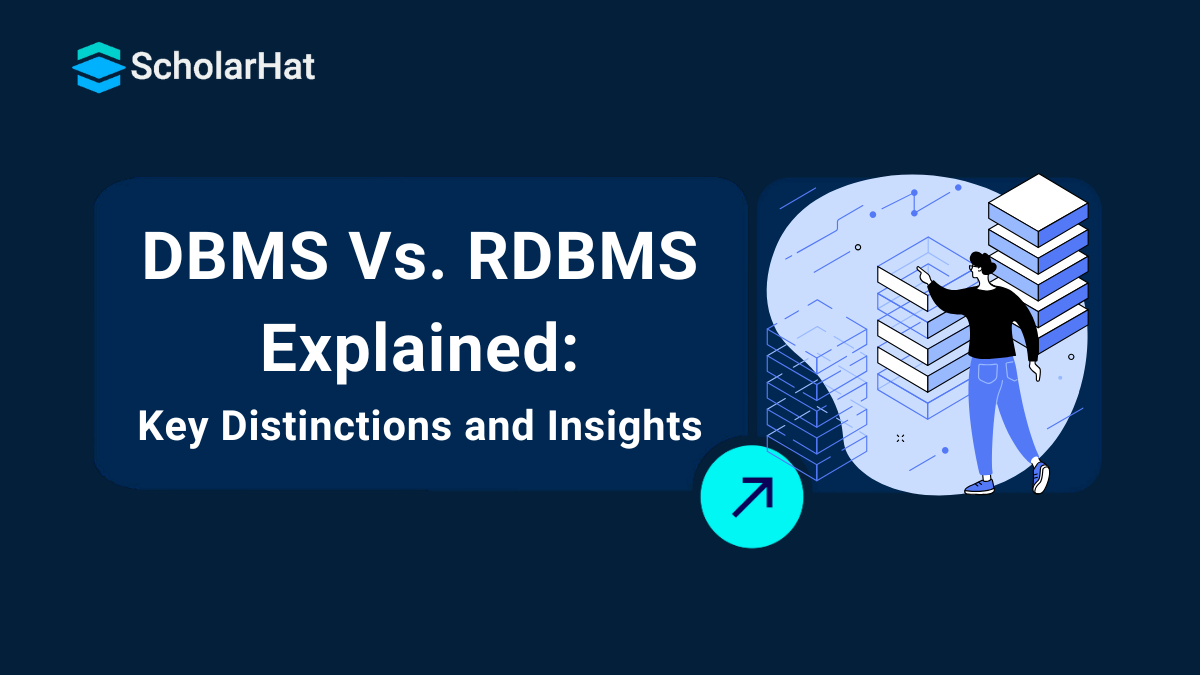26
DecDifference Between DBMS and RDBMS: A Comprehensive Guide
Difference Between DBMS and RDBMS is a key concept in database management. A DBMS (Database Management System) is software that helps store and manage data efficiently, but it does not enforce relationships between tables. On the other hand, an RDBMS (Relational Database Management System) follows a structured format where data is stored in related tables using keys (primary and foreign keys).
In this DBMS vs RDBMS tutorial, we explore the major differences between DBMS and RDBMS with examples. Also, including why we use DBMS & RDBMS, their features, Advantages, and Disadvantages.Whether you're preparing for an interview or improving your database knowledge, understanding this distinction is essential for working with modern databases.
In this article, we will explore the basics of DBMS and RDBMS, and highlight their key differences. Read on to learn more!
Read More: DBMS Viva Questions and Answers |
What is DBMS?
Database Management System (DBMS)is a software developed for storing, managing, defining, and retrieving data in a database. The software can simultaneously handle the data, the database engine, and the database schema, making it simple to organize and alter data contained in the database.

Why is DBMS Required?
A DBMS (Database Management System) is required to store, manage, and organize large amounts of data efficiently. It helps ensure data is easily accessible, secure, and can be updated without errors.
| Read More: DBMS Interview Questions |
Why do we use DBMS?
- Database Management System (DBMS) manages the entire flow of data, including insertion and retrieval.
- DBMS ensures the uniformity and integrity of the database.
- It handles how data is inserted into the database.
- DBMS optimizes the speed of data retrieval and insertion.
Features of DBMS
1. Data Storage and Retrieval
- Expertly storing data in a structured manner.
- Support quick and easy retrieval of the data.
2. Data Integrity
- Guarantee data accuracy and consistency over the lifecycle.
- Apply rules and constraints to maintain data integrity.
3. Data Modeling
- Provides tools and techniques for designing data models.
- Supports in defining the relationship between tables.a
4. Data Redundancy Control
- Reducing data duplication by normalizing data.
- Minimizing storage costs and improving data consistency.
5. Query Language
- Support languages like SQL for data manipulation and data retrieval.
- Allows users to perform complex queries.
Advantages of DBMS
1. Data Independence
- Separate the data from the applications that we use.
- Allow changes in the database without affecting the application functionality.
2. Improved Data Sharing
- Support data sharing across different applications and departments within an organization.
- Promoting collaboration and informed decision-making.
3. Enhanced Performance
- Applies optimization tools and techniques such as indexing, caching, and query optimization to enhance the performance of data operations.
- DBMS handles large volumes of data with indexing, caching, and data partitioning, ensuring faster data access and manipulation.
4. Comprehensive Data Management
- Provides tools for data modeling, schema definition, and data relationships.
- Enabling a comprehensive approach to data management.
5. Data Security
- DBMS provides robust backup and recovery mechanisms to prevent data loss and ensure data availability.
- DBMS allows for defining user roles and permissions, ensuring that only authorized users can access or modify specific data.
Disadvantages of DBMS
1. Complexity
- DBMS systems can be highly complex.
- It needs specialized knowledge to design, implement, and manage.
2. Cost
- It needs a high initial cost for hardware and software.
- It also costs for ongoing maintenance and support expenses.
3. Performance
- Performance can be challenging while performing queries and operations on huge databases.
- Extensive tuning may be required to achieve optimal performance.
4. Vendor Dependency
- The organization becomes overly reliant on a particular DBMS vendor.
- It creates a problem when the organization wants to switch to another DBMS vendor.
Read More: Referential Integrity in DBMS |
What is RDBMS?
Relational Database Management System (RDBMS) is also a software and a subset of DBMS that stores data in a structured manner in a tabular format. These tables are divided into two types, rows and columns, with each row referring to a separate record and each column indicating a field inside that record. RDBMSs use Structured Query Language (SQL) to query and manage data.

Why is RDBMS Required?
- RDBMS (Relational Database Management System) is required to store data in a structured way using tables. It helps organize data, maintain relationships between tables, and ensure data integrity and security.
Why do we use RDBMS?
- Relational Database Management System (RDBMS) is a type of DBMS that deals with relations and key constraints.
- It helps reduce data redundancy.
- RDBMS ensures the preservation of database integrity.
Features of RDBMS
1. Table-Based Structure
- Data is stored in a table format that has rows and columns.
- Each row represents a unique record, and each column represents the field within the record.
2. Primary and Foreign Keys
- The primary key unequally differentiates each record of the table.
- The foreign key establishes relationships between tables.
3. ACID Properties
- Support Acid(Atomicity, Consistency, Isolation, Durability)
- Ensure reliable transaction processing and maintain database consistency.
4. SQL (Structured Query Language)
- Allow a regulated language for querying, updating, and managing data.
- SQL commands cover data retrieval, insertion, updating, deletion, and database administration.
5. Indexing
- Uses indexes to enhance the speed of data retrieval operations by creating quick access paths to data stored in tables.
6. Views
- Allows the creation of virtual tables (views) that represent a subset of the data from one or more tables.
- Provides a customized perspective for different users.
Advantages of RDBMS
1. Structured Data Organisation
- RDBMS uses tables to organize data.
- Making it easier to manage and query complex data relationships.
2. Acid Compliance
- RDBMS follows ACID (Atomicity, Consistency, Isolation, Durability) properties.
- It supports reliable transaction processing and enhances data reliability.
3. Concurrent Access
- Allows multiple users to access and manipulate the data simultaneously.
- Maintains data integrity through locking and transaction management mechanisms.
4. Scalability
- RDBMS can manage large volumes of data efficiently.
- It supports a large number of concurrent users, offering better scalability than traditional DBMS.
Disadvantages of RDBMS
1. Complexity
- Designing, implementing, and managing database data is complex and requires specialized knowledge and experience.
2. Cost
- While scaling up, it can become challenging and costly to scale horizontally for extremely large-scale applications.
3. Rigidity
- It is not so flexible in controlling unstructured or semi-structured data compared to NoSQL databases.
Difference Between DBMS and RDBMS
| DBMS | RDBMS |
| DBMS stores data as a file. | RDBMS stores data in tabular form |
| Data elements need to be accessed individually. | Multiple data elements can be gained at the same time. |
| No relationship between data. | Data is stored in the form of tables, which have a relationship to each other. |
| Normalization is not present in DBMS. | Normalization is present in RDBMS. |
| DBMS does not apply any security in relation to data modification. | RDBMS defines the integrity limitations for the ACID property. |
| The database management system must provide some consistent techniques for accessing the stored information. | RDBMS system applies a tabular structure of the data and a relationship between them to access the stored information. |
| DBMS does not support distributed databases. | RDBMS supports distributed databases. |
| DBMS is used for small organizations and deals with small data. It supports a single user. | RDBMS is developed to manage large amounts of data. It supports multiple users. |
| Data redundancy is common. | Data redundancy is not possible using keys and indexes |
| There is no sense of safety. | Multiple security levels are available. At the OS, command, and object levels, log files are produced |
| Individual data items must be accessed. | SQL queries make it simple to retrieve data. And many data items can be accessed |
| Examples of DBMS are file systems, XML, etc. | Examples of RDBMS are MySQL, Postgres, SQL server, oracle, etc. |
When do we use DBMS vs RDBMS?
The selection between DBMS (Database Management System) and RDBMS (Relational Database Management System) is regulated by a number of criteria connected to your application's unique requirements. The reasons are depicted below:
Using DBMS over RDBMS
- Simple Data Storage
- Unstructured Data
- Less Overhead
- Less Rigorous Data Integrity Requirement
Using RDBMS over DBMS
- Structured Data
- Complex queries
- Data Integrity
- Multi-User Environment
Conclusion
In this article, we have discussed the core concepts of DBMS and RDBMS, including their key differences, features, and advantages & disadvantages. The difference between DBMS and RDBMS is ultimately determined by your application's unique needs, such as data complexity, the necessity for relationships and integrity, and the size of your data activities. To implement your understanding, you can consider taking our SQL Server Course and MongoDB Course.
Let the quiz begin! Pick the right answers and climb to the top!
Q 1: What is the main difference between DBMS and RDBMS?
FAQs
DBMS
- Microsoft Access
- FileMaker Pro
- SQL lite
- MySQL
- PostgreSQL
- Oracle Database
- Microsoft SQL Server
- Structured Data Management
- Data Integrity and Redundancy Reduction
- Advanced Query Capabilities
Take our Dbms skill challenge to evaluate yourself!

In less than 5 minutes, with our skill challenge, you can identify your knowledge gaps and strengths in a given skill.










